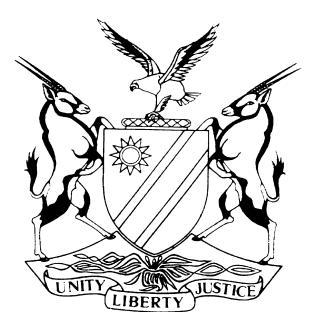4
REPUBLIC OF NAMIBIA

HIGH COURT OF NAMIBIA MAIN DIVISION, WINDHOEK
LEAVE TO APPEAL RULING
PRACTICE DIRECTION 61
Case Title: Tamson Tangeni Hatuikulipi v The State | Case No: CC 06/2021 | |
Division of Court: Main Division | ||
Heard before: Mr Justice Munsu | Heard on: 11 April 2023 | |
Delivered on: 26 April 2023 | ||
Neutral citation: Hatuikulipi v The State (CC 06/2021) [2023] NAHCMD 223 (26 April 2023) | ||
IT IS ORDERED THAT:
| ||
Reasons for decision: | ||
MUNSU J [1] On 27 December 2022, this court handed down judgment refusing bail to the applicant. [2] The applicant is dissatisfied with the judgment and approached the court for leave to appeal to the Supreme Court. [3] He raised several grounds upon which his application is premised. These can be summarised as follows: 3.1 The court failed to adequately consider the personal circumstances of the applicant before deciding to refuse bail; 3.2 In light of the untruths and contradictory evidence of the investigating officer, a new perspective was established on the old facts; 3.3 The court failed to consider the totality of the new facts showing the weakness of the State’s case; 3.4 Pre-trial incarceration constitute a new fact which alone is a sufficient ground to grant bail; 3.5 The court failed to balance the liberty of the applicant who is presumed innocent until proven guilty; 3.6 The court over-emphasised the strength of the State’s case and ignored the evidence that tend to show the State case to be less than strong prima facie case. [4] In considering the application for leave to appeal, the court must decide whether there exist reasonable prospects of success on appeal. Reasonable prospects of success on appeal means that the court seized with an application for leave to appeal must be satisfied that, on the facts or conclusions of the law involved, the court of appeal may take a different view and come to a different conclusion.1 The mere fact that a case is arguable on appeal is insufficient, as there must be substance in the argument advanced on behalf of the applicant.2 [5] I must clear my mind and avoid letting my earlier decision on the subject cloud my judgment as I proceed to determine the matter. [6] In this matter, the court adjudicated on a second bail application on new facts. The magistrate who heard the applicant’s initial bail application came to the conclusion that the nature of the offences, the public interest and the administration of justice made it impossible for the court to grant bail to the applicant. [7] The new facts relied upon by the applicant are: deteriorating personal circumstances; completed investigations; extended incarceration and the possibility of a protracted trial. The court considered these factors, not in isolation, but against all the factors attendant to the case, inclusive of those favourable to the applicant, as well as those weighing against him. To this end, the court found that these new factors did not establish a new perspective that changed the basis on which bail was initially refused. [8] The applicant raised as a new fact, that the disclosure reveals that the State has no prima facie case against him. However, upon consideration of the evidence presented, the court found that the State managed to show that the applicant was involved in the creation of Namgomar which was involved in dubious dealings. The court further found that the applicant’s entities received substantial payments from tainted sources such as Namgomar Pesca Namibia and DHC. Thus, there was no basis in this ground. [9] The above findings remained intact regardless of the applicant’s criticism of the court’s silence on the credibility of Johannes Stefannson who was not a witness in the bail proceedings. The same applies to the forensic report by Deloitte of which the court did not comment about. [10] The applicant is adamant that investigations in the matter are not completed. On the other hand, the State was very clear that investigations have been completed and the matter is ready for trial with dates being set. The State submitted that if there is any investigations to be carried out, it will only be in respect of new issues that may arise. As such, the assertion by the applicant in this regard is unsubstantiated. In any event, incomplete investigations did not play a role is the refusal of bail by the magistrate. [11] The applicant also took issue with the court’s observation in paragraph 49 of the judgment where the court found that the delays in the matter were not occasioned by the State but the applicant’s co-accused. The observation was only necessary to the extent that the applicant placed blame on the State for the delays in the matter which appeared not to be the case. [12] The court appreciated that the applicant is innocent until proven guilty and that the court should lean in favour of his liberty. To this end, the court engaged into a balancing exercise by weighing the new facts against the old facts and found that the basis upon which bail was refused by the magistrate did not change. [13] Therefore, I find that the applicant does not enjoy any prospects of success on appeal and his application should accordingly fail. [14] In the result, I make the following order:
| ||
Judge’s signature: | Note to the parties: | |
D Munsu Judge | None | |
Counsel: | ||
Applicant | Respondent | |
Mr F Beukes of Metcalfe Beukes Attorneys Windhoek | Mr H Iipinge of The Office of the Prosecutor-General Windhoek | |
1 S v Ningisa and Others 2013 (2) NR 504 (SC).
2 See S v Hauulu (CC 06/2018) [2023] NHNLD 33 (21 April 2023).